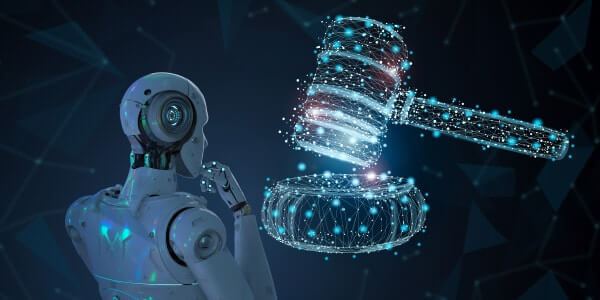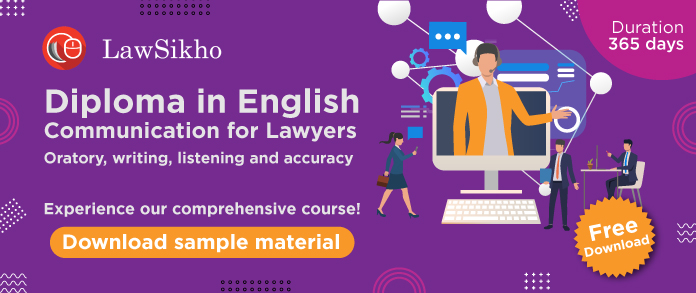This article is written by Aarzoo Guglani, a student at ILS Law College, Pune. This article deals with the use of Artificial Intelligence in the legal sector, its advantages and disadvantages. This article is edited by Ilashri Gaur, a law student pursuing B.A. LLB (Hons.) from Teerthanker Mahaveer University (CLLS).
Table of Contents
Introduction
Artificial Intelligence (AI) is when artificial systems, like that of a computer system, work or perform tasks that ordinarily require human intelligence. Where every sect of our lives is slowly getting overpowered by AI from washing our clothes in an automated washing machine to asking Siri to tell a joke, the legal industry is not any exception. Artificial Intelligence is capable of taking over major aspects of the legal system, from researching to giving judgment.
Artificial intelligence in the legal industry
As someone rightly said, AI won’t replace lawyers but lawyers who use AI will replace those who don’t. AI in the present has just begun to come into use by the lawyers, for the AI to have a positive impact on the legal industry, it is important for everyone to use it. The In-house lawyers and traditional law firms, if not accept the new era of AI will face severe backlash. As in Altman Weil’s 2017 Law Firms in Transition Survey it depicted the legal market to be experiencing an increase in price competition, lack of efficiency in delivery service, an entrance of new competitors, and all this with an inescapable influx of technological innovation.
AI in different legal technology will not automate the profession itself or won’t scratch out the need for lawyers and judges out of existence. Rather the technology will increase the proficiency, productivity, and accuracy leading to the growth of the industry. AI is expected to replace the laborious work which includes legal research, document mining, and predicting case outcomes, which are becoming faster, better, and cheaper with the assistance of intelligent software.
More importantly in the legal profession, there is hardly any scope of mistakes, every citation, every case law, every law of that matter should not only be read and recited perfectly but also should be interpreted the way it was meant to, and all this can be ensured with cleverly integrated AI algorithms. Soon the clients will demand it. The growth in the use of sophisticated technology among clients will force law firms and lawyers to pursue the same. The firm or the lawyer who can more effectively, with their enhanced technology, focus and solve the clients legal and business problems will be chosen over the ones who don’t.
Examples of AI technology in the legal industry around the world
As mentioned above some of the promising areas which are taken over by AI includes:
- Contract reviewing and analyzing: Contract has to be viewed in bulk and on an individual basis. Lawyers review contracts they make comments and redlines and advise clients respectively. For firms and companies with hundreds and thousands of contracts, which are already signed, it becomes tedious for the firm to keep a record of every contract, about its renewal, its future financial obligation, its expiration dates etc.
AI thus comes in handy in situations like this, AI platforms, such as the one provided by Kira Systems, allow lawyers to identify, extract, and analyze business information contained in large volumes of contract data. This is used to create contract summary charts for M&A due diligence.
Some AI like LawGeex uses AI to analyze contracts one at a time, as part of a lawyer’s daily workflow. It primarily contains a list of clauses and variations which are to be rejected or accepted in a contract. Therefore when a contract is uploaded into such software, the person only has to select the clauses and variations from the list and then after scanning the result tells us what all clauses and variations are present or missing.
At JPMorgan, an AI-powered program called COIN has been used since June 2017 to interpret commercial loan agreements. Work that previously took 360,000 lawyer-hours can now be done in seconds. The bank is planning to use the technology for other types of legal documents as well.
In the words of U.S. Supreme Court great Oliver Wendell Holmes, presciently written over a century ago, “For the rational study of the law the blackletter man may be the man of the present, but the man of the future is the man of statistics.”
- Legal Research: Be it a law student or a practising lawyer, research is the first and most crucial step when finding case laws and precedents for the case in hand. Often it happens that this step itself takes several hours and still no result.
Previously the research work was done manually by physically going through every commentary to find relevant case laws, now we have search engines like LexisNexis, Westlaw, SSC Online etc. but AI takes this process to a next level, which goes beyond the concept of mechanical key-word matching to a level of surfacing actual relevant case laws.
Companies like Casetext and ROSS Intelligence are building research platforms that have a more sophisticated semantic understanding of legal opinions’ actual meanings.
- Predicting the result: The results are usually predicted by lawyers for the ease of the clients, as to whether there is any scope of the case if it goes for trial or whether the client should settle it beforehand.
A bunch of AI groups are creating models of software to predict the outcome of pending cases, using the summary of the relevant precedent and the fact pattern of the case at hand. According to a Toronto-based legal startup Blue J Legal (Tax Law), their AI-powered legal prediction software can predict results with 90% accuracy.
“We are already starting to see significant advantages being gleaned by sophisticated parties leveraging machine learning legal prediction technologies,” said Blue J Legal CEO Benjamin Alarie. “In the next ten years, these algorithmic technologies will become the natural starting point for legal advice.”
Also, a London law firm used data of the judgments of 600 cases over 12 months to build a model for the viability of personal injury cases. Trained on 200 years of Supreme Court records, the AI they claim is already better than many human experts at predicting decisions.
Situation in India
India although being a labor driven country, it has never stopped opportunities for Artificial Intelligence in different sectors. India Ranks third in overall use of Artificial Intelligence in the world, with 19% of our industries using AI. Likewise, the Legal Industry in India is slowly progressing towards the use of AI in various of its aspects. As, after 2017, when Cyril Amarchand Mangladas for the first time in India introduced AI software through its agreement with Kira Systems, a Canada- based software provider, almost 4% of the legal industry is now using AI-based software for efficient working.
The Indian Society of Artificial Intelligence and Law is the only society in India which conceives of the incorporation of Artificial Intelligence into the field of Law, wherein it is a multidisciplinary collaboration between Law and Information Technology (particularly Data Science and AI). Their objective is to “spread the message of hope and compassion. We believe that a single action can make a difference in the community, and that collective action can greatly impact the world”.
Indian legal industry though at a slow pace, but is sure on its way to becoming one of the biggest industries for using AI in nearly every aspect.
Benefits and limitations of AI in the legal sector
The two half of the legal industry is convincing the other half for AI being a “bane”, while the latter has already accepted the new technology as a “boon”. Thus here are some benefits and limitations of AI:
Benefits
Apart from the ease in legal research, contract reviewing, and prediction of outcomes (discussed in examples of AI section) some of the others are:
- Time-saver: Negotiating a contract or resolving a case is for sure a very time-consuming work because it involves a large amount of paperwork and documentation, a large part of which is just mechanical. And such mechanical works do nothing but waste counsels’ time. Therefore use of such AI which reduces the work of lawyers as well the judges, will be a benefit on lawyers as well as clients, who get their work done faster. Thousands of pages of contracts can be easily scanned through the AI software to find the essential elements of the contract and there is no need for the lawyer herself to go through all the thousand pages.
For example: At JPMorgan, an AI-powered program called COIN has been used since June 2017 to interpret commercial loan agreements. Work that previously took 360,000 lawyer-hours can now be done in seconds.
- Error reduction: Manual doing of things always has a higher risk of committing errors, whereas artificial technology has the potential to reduce the errors to zero. This will also save the lawyer after-effects of drafting an erroneous document, which is dismissal and re-drafting.
- Creating Contracts: Another benefit of AI devices is that they can create contracts by utilizing effective tools. These devices act as a self-service tool for clients, for example, Contract Express, which is contract automation software that helps the client to create and produce agreements they require, enter a few terms and conditions, and the structure will deliver a standard shape understanding prepared to go.
- Cost-effective: Though installation of an AI at first requires a huge amount of investment, in the long term it is very cost-effective as it is a replacement of many paralegals or clerks. All the work a paralegal or a clerk is supposed to do from research to error identification will be now done by the AI.
Limitations
After discussing all the good things about AI its is also important for us to take into account what are the cons of AI as well so that we can comprehend whether the pros outshine the cons or not.
- Unemployment: the greatest bane of AI is the amount of unemployment it will create in the legal sector. According to Deloitte, it is estimated that nearly 100,00 legal-related jobs will be automated by 2036 because of AI. They also report that by 2020 law firms will be faced with a “tipping point” for a new talent strategy.
- Vulnerable to attack: With every document and contract being uploaded on a machine because of AI, there are higher risks of cyber threats, such as the data getting hacked and stolen. Therefore cybersecurity issues rise with more no. of work being done through AI.
- Prone to damage: One of the biggest limitations of AI is that a machine or software cannot be trusted, as a little damage in the system can create a huge mess for the operator. This damage might not even be reversible. Therefore, though AI can prove to be errorless sometimes, it can never guarantee that the system won’t misbehave. Also due to this, the company has to bear a huge price for its reinstallation and for other expenses.
- Ethical Concerns: An AI is created through a mathematical algorithm and any process done using it will only show the results of what data has been fed into it. In the scenario where AI is used for predicting outcomes, it should be remembered that it doesn’t have a brain of its own to think in matters like equity judgement, where mere facts cannot decide the case, inherent nature of sensitivity is required which are there in humans but missing in software.
- Wealth inequality: the firms that have the financial strength and resources to adopt this new technology would benefit more than the cash stripped traditional firms. This would lead to wealth inequality. Perhaps an instance where “the rich” — those individuals and companies who have the means to pay for AIs — getting richer.
What to expect in the future
The only thing which can be expected from the future is the exponential growth of Artificial Technology. For sure there won’t come a time where machines outgrow actual lawyers and judges, because if that happened- an over-dependence on AI to perform these tasks due to a shift in standards, will create an obligation on lawyers to refrain from making unassisted decisions. Man will find it difficult to function without these AI tools which could seriously hamper the cognitive processes of the human mind in the long run.
Apart from such threats, the growth of AI in the future will outshine its disadvantages and create an environment of greater efficiency and productivity. It will ensure:
- Innovation in client services.
- Higher profit margins of the firms.
- Making technology the foundation of growth.
Conclusion
“In the legal profession, AI has gradually found its way into supporting lawyers and clients alike. Law firms that have adopted this powerful technology are witnessing an increase in their productivity and efficiency.” These words by Indian legal tech explains a lot about the involved relationship of the law industry and AI. Technology is transforming the legal profession, but it will not make the professional judgment and expertise of lawyers obsolete. It will enable those who adopt, employ, and leverage it to provide better and more cost-effective legal services and representation for their clients. Legal organizations and lawyers who embrace AI legal technology today will reap those benefits—and have a competitive advantage over those who do not.
LawSikho has created a telegram group for exchanging legal knowledge, referrals and various opportunities. You can click on this link and join:
 Serato DJ Crack 2025Serato DJ PRO Crack
Serato DJ Crack 2025Serato DJ PRO Crack











 Allow notifications
Allow notifications


